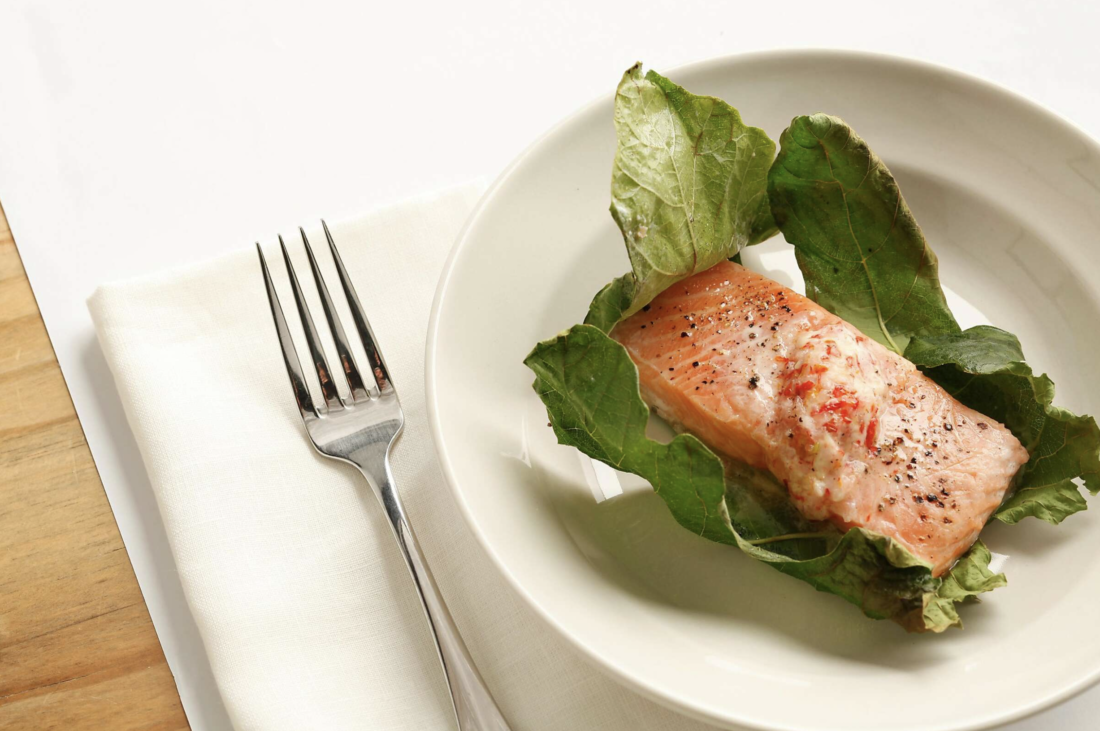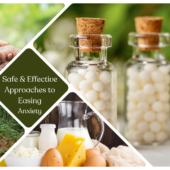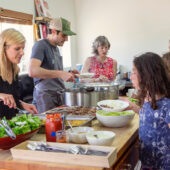Access to all articles, new health classes, discounts in our store, and more!
King Salmon in Fig Leaves

It’s worth taking the time to hunt down fig leaves, perfect for keeping salmon moist. Sauced with a little nasturtium butter, this fish dish is easy, beautiful, and wonderfully aromatic. You can also cook the filets, or a whole salmon, on a grill; the fig leaves will prevent the fish from sticking. Nasturtium blossoms are generally available in the produce section of upscale grocers or at farmers’ markets.
Serves 4 to 6
Ingredients
- 6 skinless salmon filets (about 2 pounds total), pin bones removed
- Extra virgin olive oil
- Kosher salt and freshly ground black pepper, to taste
- 6 large young fig leaves, washed
- 6 tablespoons butter, softened
- 1 teaspoon lemon juice
- ½ teaspoon finely chopped lemon zest
- 1 medium shallot, finely diced
- 24 nasturtium blossoms (see note)
Instructions
Preheat the oven to 400° F. Lightly coat the salmon with olive oil, and season with salt and freshly ground pepper.
Wrap each portion of fish individually in a fig leaf, folding the edges of the leaf over the fish. It is all right if the fish is not completely enclosed.
Prepare the nasturtium butter: Stir together the softened butter, lemon juice, lemon zest, and shallot. Remove the stems from the nasturtiums, chop the blossoms, and stir into the butter. Season with salt and pepper. Let the butter sit for a few minutes, taste, and adjust the seasoning. Leave the butter at room temperature while you bake the fish.
Place the salmon on a baking sheet and bake in the upper part of the oven until the fish is just cooked through, 6 to 9 minutes.
Transfer the salmon packages to a serving platter or individual plates. Peel the fig leaves back to expose the salmon and spread some of the nasturtium butter on each portion.
Note: You can replace the nasturtiums with herb blossoms or a few chopped capers.
Reprinted by permission of Alice Waters from Six Classic Recipes from the Chez Panisse Café.
Alice Waters is a chef, author, and food activist, and founder of the renowned Chez Panisse restaurant in Berkeley, CA. She is the author of numerous books, including We Are What We Eat: A Slow Food Manifesto (2021). Learn more about her work and the Edible Schoolyard Project at edibleschoolyard.org.
Published in the Journal of Health and Healing™
Winter 2022 – 23 | Volume 46, Number 4
Copyright © 2022 Price-Pottenger Nutrition Foundation, Inc.®
All Rights Reserved Worldwide





